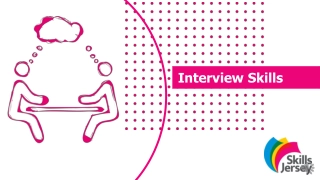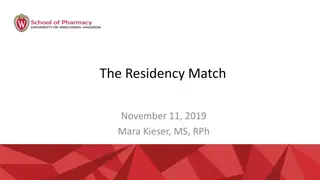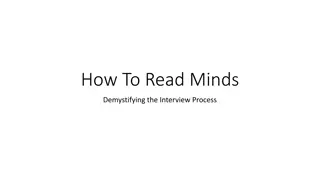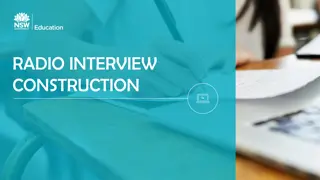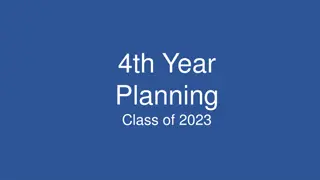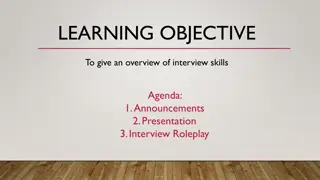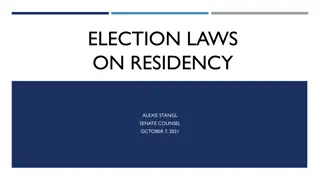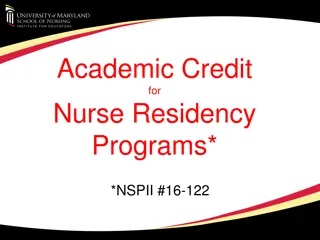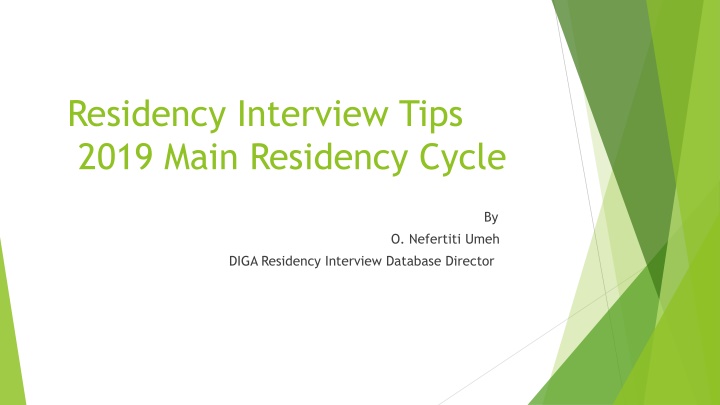
Insider Tips for Residency Interviews in 2019
Get expert advice on excelling in residency interviews for the 2019 main residency cycle. Learn about key aspects like pre-interview communication, assessing strengths and weaknesses, common interview questions, and the importance of knowing your residency application inside out.
Uploaded on | 4 Views
Download Presentation

Please find below an Image/Link to download the presentation.
The content on the website is provided AS IS for your information and personal use only. It may not be sold, licensed, or shared on other websites without obtaining consent from the author. If you encounter any issues during the download, it is possible that the publisher has removed the file from their server.
You are allowed to download the files provided on this website for personal or commercial use, subject to the condition that they are used lawfully. All files are the property of their respective owners.
The content on the website is provided AS IS for your information and personal use only. It may not be sold, licensed, or shared on other websites without obtaining consent from the author.
E N D
Presentation Transcript
Residency Interview Tips 2019 Main Residency Cycle DIGA Residency Interview Database Director O. Nefertiti Umeh By
Interview Tips Residents have input on the final decision! Update coordinator with any changes Interpersonal skills and interactions with ALL faculty and staff are the most important things considered from the PD perspective when ranking applicants!
Before the interview Be prepared for pre-interview communication with programs: Interview invites can be sent via email and/or through ERAS from the Program Director s workstation. All email communication should be concise, succinct, and professional. Prepare your one-minute pitch: A pitch is a brief summary used to quickly define a person. Your pitch should highlight specific points of your medical education journey. You can begin your pitch by discussing your current status and working backwards addressing any relevant work experience and education or vice versa. Use the answers to write a message that you can share with someone in one minute or less.
Assess your greatest strengths and weaknesses Your response to this question can dictate the direction of the interview. Here are some things you may want to consider when responding to this question: STRENGTHS: You want to avoid the common responses that interviewers will hear from applicants such as hard worker, dedicated to the specialty, and determined, . Create three to five strengths that match what the residency program is seeking and provide BRIEF examples to demonstrate why that is your strength. WEAKNESSES: Responding to this question will consist of two important aspects: Describing your REAL weakness How you are working to improve your weakness? Identify your weakness as an area of opportunity you can improve in and discuss the steps you are taking to improve this weakness. Refrain from clich examples like being a perfectionist, being hard on yourself, or too detail oriented.
Common interview questions Tell me about yourself. Why did you choose Dermatology? Who is your role model and why? Tell me about your research? Tell me about a particularly memorable patient. Tell me about a challenging time you had in medical school How would you handle working with someone you disliked? What causes you stress and how do you deal with it? How would you spend 1 million dollars? **For more please see DIGA s fall newsletter!!
KNOW YOUR RESIDENCY APPLICATION! Everything you have submitted is fair game to be asked about. Be prepared to talk about it all. example; clinical experiences from your clerkships, academic work, publications, research experience, and anything featured on your personal statement.
Research the program and prepare your own questions Familiarize yourself with the programs where you will be interviewing and be prepared to ask thoughtful questions to show that you are interested in the program. Gathering information about the program will not only assist you in formulating well thought out questions but it will also help you make informed decisions on where you will place programs on your rank order list
DURING THE INTERVIEW Attend dinner the night before (if offered) Arrive early the day of the interview Arrive prepared Have copies of your documents: CV, personal statement, transcript, notepad, and a list of additional relevant accomplishments, including any published articles. Dress professionally and conservatively Shake hands Do not speak negatively of any other programs or your school Be polite Do not display arrogance, disinterest, or lack of sincerity. All verbal and nonverbal communication should display enthusiasm. Make sure to be polite and friendly with EVERY INDIVIDUAL you interact with at all times. This includes residents, faculty, coordinators, secretaries, and all other hospital staff.
Post interview Take notes of your impressions of the program to assist in your rank list later on Consider the appropriate time to contact the PD to express strong interests and Thank you notes. Average number of contiguous ranks = 9 92% of applicants ranked programs by preference 7% of applicants ranked programs by likelihood of matching 38% of applicants ranked a handful of programs in an alternative specialty as fall-back plan

